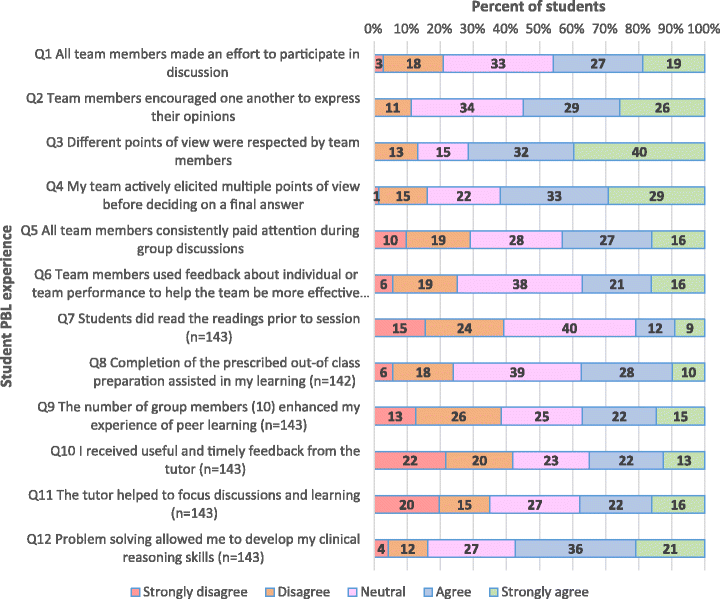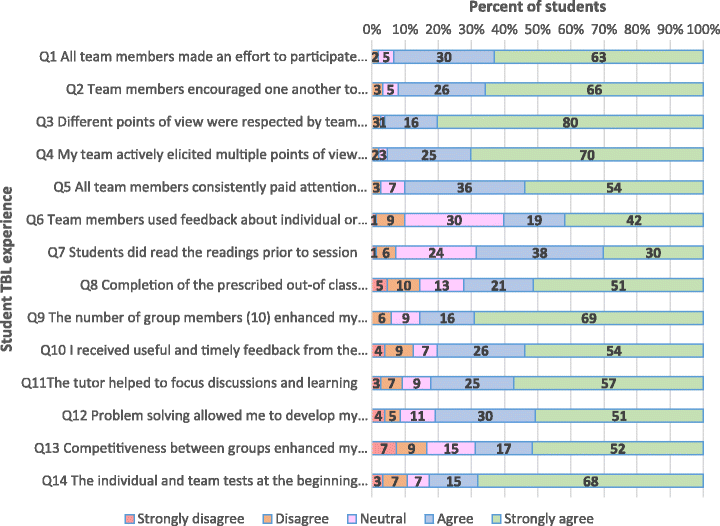Team-based learning (TBL) in the medical curriculum: better than PBL?
- PMID: 29221459
- PMCID: PMC5723088
- DOI: 10.1186/s12909-017-1068-z
Team-based learning (TBL) in the medical curriculum: better than PBL?
Abstract
Background: Internationally, medical schools have long used a variety of approaches to develop hybrid Problem based learning (PBL) curricula. However, Team-based learning (TBL), has gained recent popularity in medical education. TBL maintains the advantages of small group teaching and learning, but in contrast to Problem-based learning (PBL), does not require large numbers of tutors. In 2016, TBL was introduced to Year 1 of the Sydney Medical Program (SMP).This study sought to compare students' perceptions of using TBL in place of PBL.
Methods: Year 1 students (n = 169) completed three PBL and three TBL sessions during one of the following teaching blocks: Musculoskeletal (n = 56), Respiratory (n = 59) or Cardiovascular (n = 54). Student feedback following completion of each block of teaching was collected by questionnaire, using closed and open ended items. Data were analysed using descriptive statistics and thematic analysis.
Results: In total, 144/169 (85%) of participants completed a questionnaire regarding PBL, and 152/169 (90%) completed a similar questionnaire regarding TBL. The students found positive aspects of their TBL experience to include the smaller group size, the use of readiness assurance tests, immediate feedback from senior clinicians, and time efficiency. In PBL, students reported that variable expertise of tutors; limited direction; and large group size hindered their learning.
Conclusions: Overwhelmingly, students preferred TBL over PBL, as the optimal teaching strategy. Students found the structure and format of the TBL sessions more conducive to learning, engagement and participation than PBL sessions. Although the use of TBL required an instructional approach, needing direction from the tutor, it remained student-centred, generating a range of positive outcomes. Study results provide confidence to change from PBL to TBL within Year 1 and Year 2 of the SMP in 2017.
Conflict of interest statement
Ethics approval and consent to participate
The University of Sydney Human Research Ethics Committee approved the study. Written consent for participation was obtained from participants to enable us to include their data from this study.
Consent for publication
Not applicable.
Competing interests
The authors declare that they have no competing interests.
Publisher’s Note
Springer Nature remains neutral with regard to jurisdictional claims in published maps and institutional affiliations.
Figures
Similar articles
-
Implementation of team-based learning in year 1 of a PBL based medical program: a pilot study.BMC Med Educ. 2016 Feb 4;16:49. doi: 10.1186/s12909-016-0550-3. BMC Med Educ. 2016. PMID: 26846425 Free PMC article.
-
Team-based learning replaces problem-based learning at a large medical school.BMC Med Educ. 2020 Dec 7;20(1):492. doi: 10.1186/s12909-020-02362-4. BMC Med Educ. 2020. PMID: 33287811 Free PMC article.
-
Implementation of modified team-based learning within a problem based learning medical curriculum: a focus group study.BMC Med Educ. 2018 Apr 10;18(1):74. doi: 10.1186/s12909-018-1172-8. BMC Med Educ. 2018. PMID: 29631579 Free PMC article.
-
Comparing the effects of team-based and problem-based learning strategies in medical education: a systematic review.BMC Med Educ. 2024 Feb 22;24(1):172. doi: 10.1186/s12909-024-05107-9. BMC Med Educ. 2024. PMID: 38388937 Free PMC article.
-
Team-based learning: design, facilitation and participation.BMC Med Educ. 2020 Dec 3;20(Suppl 2):461. doi: 10.1186/s12909-020-02287-y. BMC Med Educ. 2020. PMID: 33272267 Free PMC article. Review.
Cited by
-
Effective Veterinary Clinical Teaching in a Variety of Teaching Settings.Vet Sci. 2022 Jan 5;9(1):17. doi: 10.3390/vetsci9010017. Vet Sci. 2022. PMID: 35051101 Free PMC article. Review.
-
Knowledge of and attitudes to occupational and sports medicine among medical students in Zagreb, Croatia.Arh Hig Rada Toksikol. 2021 Jun 28;72(3):135-139. doi: 10.2478/aiht-2021-72-3535. Arh Hig Rada Toksikol. 2021. PMID: 34187109 Free PMC article.
-
Modern techniques of teaching and learning in medical education: a descriptive literature review.MedEdPublish (2016). 2021 Jan 21;10:18. doi: 10.15694/mep.2021.000018.1. eCollection 2021. MedEdPublish (2016). 2021. PMID: 38486533 Free PMC article.
-
The Relationship Between Engagement Time in Case-based Learning and Performance on Preclinical Medical Education Exams.Med Sci Educ. 2024 Jul 13;34(6):1289-1293. doi: 10.1007/s40670-024-02112-x. eCollection 2024 Dec. Med Sci Educ. 2024. PMID: 39758470 Free PMC article.
-
Integrating team-based and peer-teaching strategies for standardized dental residency: a path to active learning and professional growth.BMC Med Educ. 2025 Apr 26;25(1):618. doi: 10.1186/s12909-025-07023-y. BMC Med Educ. 2025. PMID: 40287670 Free PMC article.
References
-
- Kinkade S. A snapshot of the status of problem-based learning in U.S. Medical Schools, 2003–04. Acad Med 2005;80:300–301. - PubMed
-
- Hendry G, Lyon P, Henderson-Smart C. Teachers’ approaches to teaching and responses to student evaluation in a problem-based medical program. Assessment Eval High Educ. 2007;32(2):143–157. doi: 10.1080/02602930600801894. - DOI
MeSH terms
LinkOut - more resources
Full Text Sources
Other Literature Sources




